Today Is The Birthday of Mammad Amin Rasulzade (Photo Gallery)
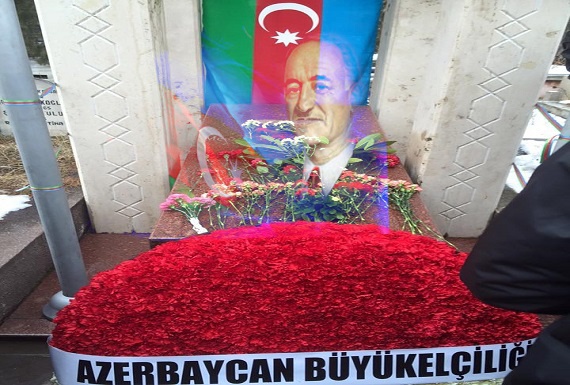
Araz News: Today is the birthday of one of the founders of the Azerbaijan Democratic Republic Mammad Amin Rasulzade.
Today is the 132th anniversary celebrates of the birth of one of the founders of the Azerbaijan Democratic Republic M.A. Rasulzade.
Political visionary ![]() Mammad Amin Rasulzade (1884-1955), who headed the Musavat Party,helped to set up the first independent government of the Azerbaijan Democratic Republic (ADR) in May 1918. But the turmoil of the times proved too much for Rasulzade’s young government. On April 25, 1920, Bolshevik troops crossed into Azerbaijan and entered Baku on April 28. They demanded the resignation of Azerbaijan’s Parliament and set up their own government. The fledging democracy-only in its 23rd month-collapsed immediately.
Mammad Amin Rasulzade (1884-1955), who headed the Musavat Party,helped to set up the first independent government of the Azerbaijan Democratic Republic (ADR) in May 1918. But the turmoil of the times proved too much for Rasulzade’s young government. On April 25, 1920, Bolshevik troops crossed into Azerbaijan and entered Baku on April 28. They demanded the resignation of Azerbaijan’s Parliament and set up their own government. The fledging democracy-only in its 23rd month-collapsed immediately.
Rasulzade, like many other distinguished personalities of the pre-Soviet period, ended up spending the rest of his life in exile. Here are the highlights of what happened as told by his grandson Rais Rasulzade, with details and anecdotes drawn from Rasulzade’s own personal writings.
Rasulzade, like many other distinguished personalities of the pre-Soviet period, ended up spending the rest of his life in exile. Here are the highlights of what happened as told by his grandson Rais Rasulzade, with details and anecdotes drawn from Rasulzade’s own personal writings.
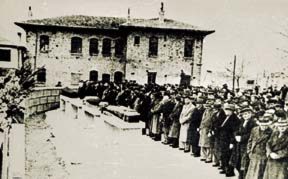 Photo: Mammad
Photo: Mammad ![]() Amin Rasulzade’s funeral in 1955 in Ankara, Turkey.
Amin Rasulzade’s funeral in 1955 in Ankara, Turkey.
After the Bolsheviks took over the government of the Azerbaijan Democratic Republic (ADR) in April 1920, my grandfather Mammad Amin Rasulzade went into hiding for several months by fleeing to Lahij, a small remote mountain village in the Caucasus-these days, about a five-hour journey from Baku by car.
The Bolsheviks went searching for him, but he managed to allude them until the day when one of his friends, who also was hiding in Lahij, sent a letter to Baku. The note was intercepted, and the authorities discovered the whereabouts of my grandfather. The Bolsheviks went to Lahij and searched all of the houses, but they still couldn’t find him. He had been carefully hidden by the local people. Realizing he was no longer safe in Lahij, he ![]() decided to move on to another village. On the way, he was stopped by soldiers. They were curious about his hands.
decided to move on to another village. On the way, he was stopped by soldiers. They were curious about his hands.
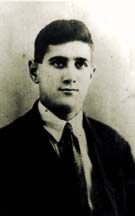
![]() In comparison to those of the other villagers, they looked too aristocratic-a dead giveaway. So they arrested him, took him to Baku and put him in prison where he was kept under very miserable conditions in a dark, cramped room.
In comparison to those of the other villagers, they looked too aristocratic-a dead giveaway. So they arrested him, took him to Baku and put him in prison where he was kept under very miserable conditions in a dark, cramped room.
Rasul Rasulzade at the age of 19. He was arrested that year (1937) and killed in 1938.
Nearly everyday he was interrogated. One day while they were questioning him, a man in a leather military jacket approached and asked: “Do you recognize me?” Rasulzade had difficulty discerning who the figure was because of the intense lights that were directed into his face during the interrogation. Finally, he said: “Koba, is that you?” It was Stalin. The two men embraced. Stalin had come to Baku immediately upon hearing that Rasulzade had been arrested. The two had a history of a long friendship.
Stalin told Rasulzade how endangered he was: “Some of the Azerbaijani Communists want you shot; others want you thrown in prison for the rest of your life. Let me save you.” But Rasulzade told Stalin that everything that the Communists had achieved in Azerbaijan had come at the expense of crushing the people’s rights and the country’s independence. Rasulzade knew that there was no hope of receiving help from the Great Powers. Stalin asked Rasulzade to go with him to Moscow since he wouldn’t be safe from the Communists in Baku if he stayed. A decision had to be made.
Early Years
Rasulzade and Stalin had met for the first time in Baku when they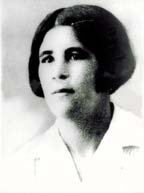
were![]() both in their twenties, around 1907. At the time, Rasulzade was working as a journalist, writing articles for various opposition magazines and working with the Musavat Azerbaijani National Party. Stalin, a Georgian, was in Baku organizing the oil workers against the authorities and the Czar. When officials tried to arrest Stalin, it was Rasulzade who had saved him by hiding him in his apartment.
both in their twenties, around 1907. At the time, Rasulzade was working as a journalist, writing articles for various opposition magazines and working with the Musavat Azerbaijani National Party. Stalin, a Georgian, was in Baku organizing the oil workers against the authorities and the Czar. When officials tried to arrest Stalin, it was Rasulzade who had saved him by hiding him in his apartment.
Khalida Rasulzade was sent into exile along with her family, but no one knows what happened to her and her child after their escape.
Rasulzade was eager to be rid of the Czar too, but he differed from Stalin in that he wanted the government to be based on democratic principles, not socialistic. Rasulzade wanted his country to be independent from the Russian Empire.
This time, it was Stalin’s turn to save Rasulzade. In the end, he accepted Stalin’s offer and went to Moscow. But first he had to say goodbye to his family.
While Rasulzade was in prison, a son was born to him-my father. It was two months before he had the chance to lay eyes on him. Right away he asked what name had been given to the baby. My grandmother told him “Aliheydar”, in honor of the First Secretary of Azerbaijan at that time. Then Rasulzade lifted the baby up, kissed him and announced: “From now on, your name is Azer, not Aliheydar.” Azer, of course, referred to the republic that Rasulzade had worked so hard to create.
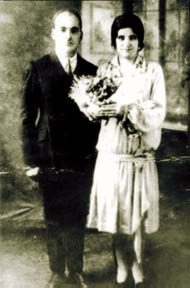
![]() Exile from Baku
Exile from Baku
After a brief visit with his family, Rasulzade had to leave with Stalin. In Moscow, Stalin offered my grandfather various government posts, but he refused because he didn’t want to work for a government that was hostile to Azerbaijan.
An interesting situation developed once when a delegation from Afghanistan came to Moscow and the Russian government needed someone who knew either Arabic or Persian. Stalin knew Rasulzade was qualified to help as he was teaching History of Eastern Literature at Moscow University at the time. But when Stalin offered him the job, Rasulzade refused-once again. Stalin was surprised and is said to have commented: “What a strange guy this Mammad Amin is. He turns down all the positions I offer him.”
My grandfather no longer felt safe to stay in Moscow after those remarks, as Stalin had a “habit” of getting rid of his “friends”. Members of Azerbaijan’s Musavat Party, which he had led, had gone underground, but they helped him organize to go to Finland. From there, he escaped to Turkey in 1922.
Latifa and her husband Damat Muslimzade in 1930. Latifa froze to death along with one of her three daughters, Eshva, while in exile.
Rasulzade then sent a letter to Stalin saying: “Sorry about leaving Moscow without your permission. But I could never have supported your position, as I have always advocated freedom and independence for Azerbaijan.”
Stalin, who happened to be on quite good terms with Ataturk, the leader of Turkey at the time, requested the extradition of all political emigrants who had carried out any propaganda against the Soviet Union. Ataturk decided not to arrest Rasulzade, and told him to leave Turkey until the situation cooled down.
It was in Poland that Rasulzade met Joseph Pilsudski, the head of the Polish government. Rasulzade and Pilsudski’s niece Vanda fell in love and started living together. In 1939, World War II broke out and Poland was occupied by German troops. So my grandfather returned to Turkey.
It wasn’t long until Hitler started looking for someone to represent him in the Transcaucasian region. He couldn’t find anyone suitable among the Armenians or Georgians but had heard that Rasulzade was highly educated and cultured.
When Rasulzade met with Hitler, Rasulzade again refused to get involved with any government hostile to Azerbaijan. He still longed for the day when Azerbaijan would be independent. When Hitler was organizing his troops, Rasulzade was asked to give a speech to them. He told them to fight only against the enemies of independent Azerbaijan, but not to kill others. Immediately he was ordered to leave Germany within 24 hours. This time he fled to Romania. Eventually he was able to return to Turkey where he died in 1955.
By Rais Rasulzade, his grandson




















